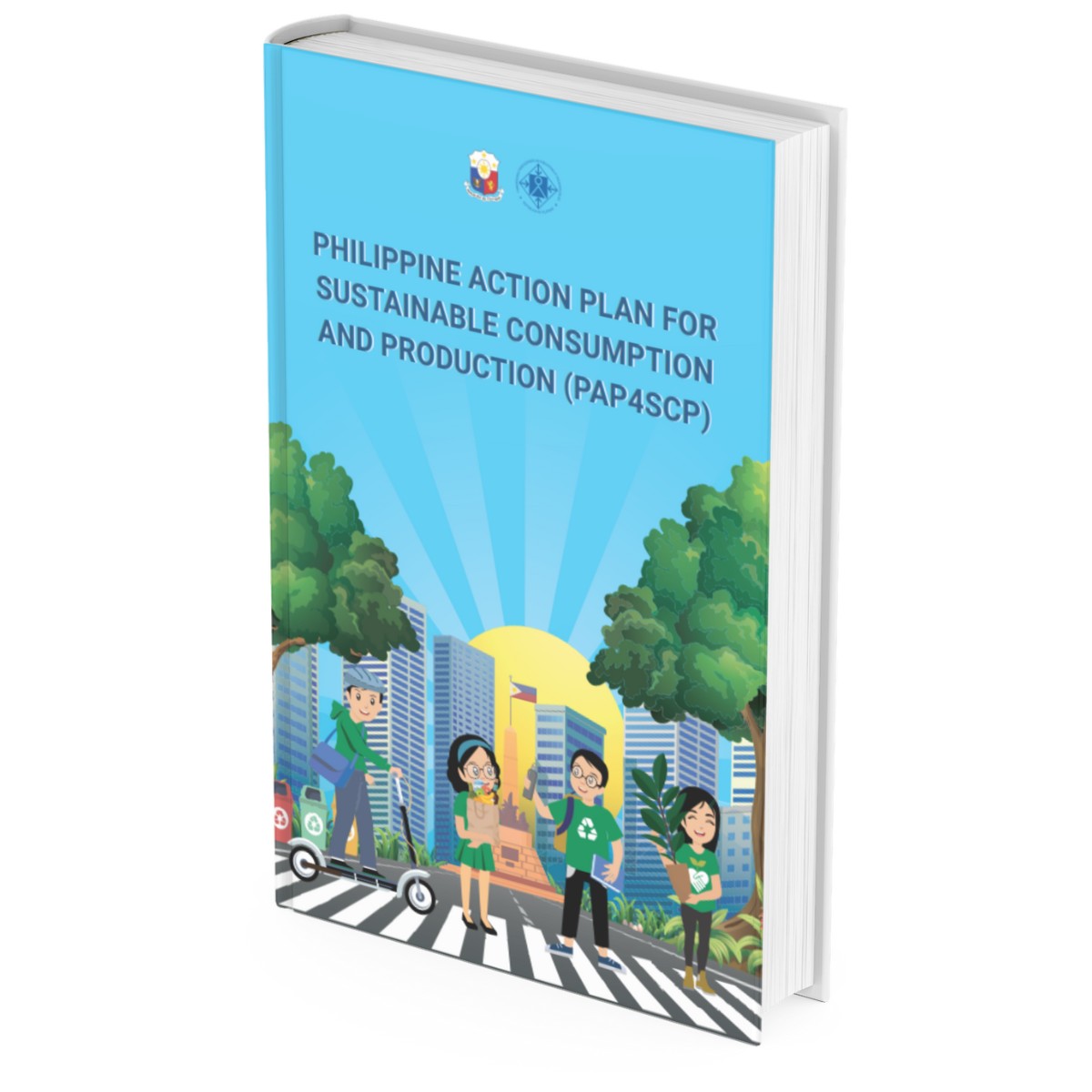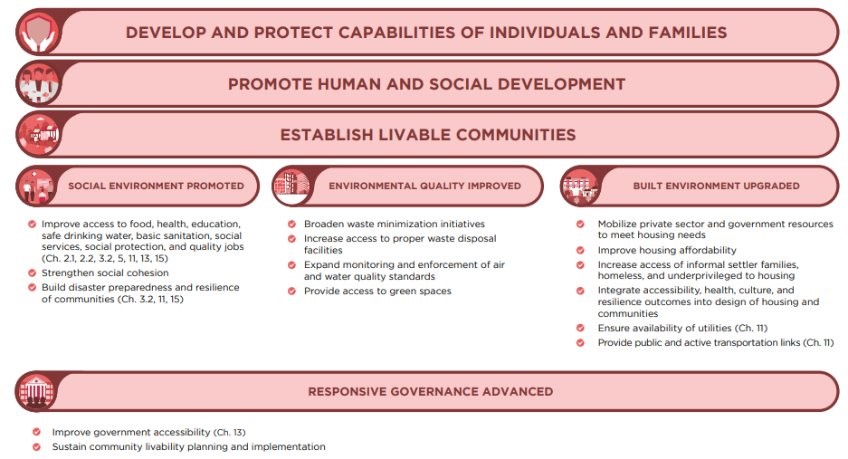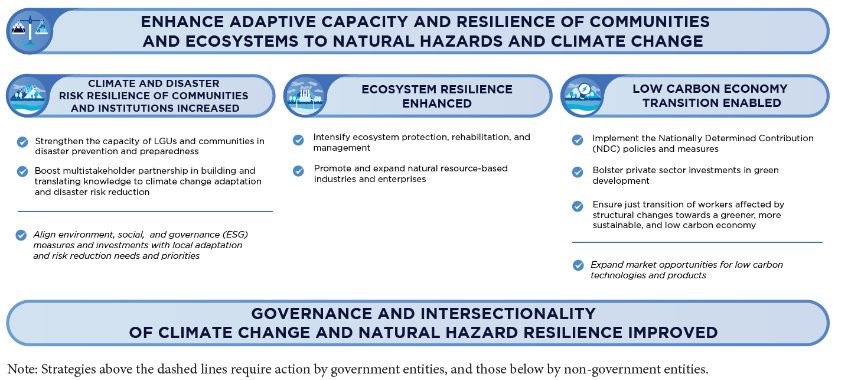
Background
Despite significant progress in recent years, the country’s efforts toward environmental sustainability remain insufficient to substantially improve the overall sector performance. Persistent challenges, such as mismanaged plastic waste, high vulnerability to climate change and disasters, water shortages, and biodiversity loss, continue to place immense pressure on the country’s Environment and Natural Resources (ENR). This is evident in the country’s declining ranking in the Environmental Performance Index (EPI), which dropped from 158th in 2022 to 169th in 2024.
Cognizant of these challenges, the Philippines has adopted an integrated and cross-cutting approach that recognizes the synergies between climate action and sustainable development. Through the Philippine Development Plan 2023-2028, the government will pursue strategies to propel economic and social transformation for a prosperous, inclusive, and resilient society. It specifically outlines key strategies to enhance the resilience of communities, institutions, and ecosystems to natural hazards and climate change, while fostering rapid economic growth, job creation, and poverty reduction. In particular, the climate and sustainability agenda in the PDP are underscored in the following Chapters:
-
Subchapter 2.3 on Establish Livable Communities aims to improve the quality of life for individuals and communities. This chapter underscores a holistic approach toward sustainable settlements, where social harmony, environmental responsibility, and robust infrastructure converge to create a livable future for Filipinos. This includes facilitating the country’s shift in our consumption and production patterns through resource efficiency, adopting more sustainable practices and lifestyles, and transitioning to circular economy pathways to alleviate pressure in the environment and natural resources sector (see chapter framework)
Strategy Framework for Subchapter 2.3:

-
Chapter 15 on Accelerate Climate Action and Strengthen Disaster Resilience intends to enhance communities' and ecosystems' adaptive capacity and resilience to natural hazards and climate change. The Chapter framework adopts a “well-being lens” where efforts on climate change adaptation and mitigation, as well as disaster risk reduction, contribute to increased income and job opportunities, improved public health, and enhanced knowledge and skills, among others (see chapter framework).
Strategy Framework for Chapter 15:

Philippine Action Plan for Sustainable Consumption and Production (PAP4SCP)
To support the implementation of PDP strategies, NEDA spearheaded the formulation of the Philippine Action Plan for Sustainable Consumption and Production (PAP4SCP) to facilitate the country’s shift to a climate-smart and sustainable economy geared to decouple economic growth from environmental degradation. The Action Plan serves as a guiding framework to influence and steer sustainable practices and behavior across sectors and levels of government by implementing programmatic policy reforms and actions over the short (2022-2023), medium (2024-2030), and long-term (2031-2040). It outlines specific executive and legislative reforms and broad-based interventions that will holistically address the continuing challenges in the environment sector while achieving economic and social development.
Plan Formulation
The PAP4SCP was crafted through a multi-stakeholder and participatory approach to incorporate the inputs and commitments from concerned agencies and institutions across sectors at the national and regional levels. The Action Plan has also gathered significant insights from key partners from the private sector and civil society organizations. It was further recalibrated to consider the new normal arising from the COVID-19 pandemic to ensure that the interventions support the country’s green recovery. In particular, the Plan Formulation followed a six-step process to deliver the expected outputs: (a) assessment/scoping of the current SCP and circular economy (CE) situation in the Philippines; (b) SDG 12 interlinkages mapping with other global goals; (c) stakeholder mapping; (d) formulation of SCP Strategic Framework; (e) identification and prioritization of key strategies/actions; and (f) SCP Action Plan Development.
SCP Strategic Framework
The Action Plan’s Strategic Framework provides a strong foundation towards achieving the country’s long-term vision or the Ambisyon Natin 2040, where the present and future generations will enjoy a "matatag, maginhawa at panatag na buhay" or a strongly rooted, comfortable, and secure life. By the end of 2040, it is envisioned to steer behavioral change with more Filipino consumers and producers preferring green goods and services and having sustainable and climate-smart practices and lifestyles.

In order to achieve such vision and goal, actions/reforms to help (a) value the economic, social, and environmental costs and benefits of production and consumption processes; and (b) efficient and equitable use and allocation of natural resources will be prioritized. These two sub-outcomes are key to internalizing/integrating the negative externalities arising from socioeconomic and environmental impacts of economic activities in the market system.
Supporting intermediate outcomes will also be pursued, to wit: (a) natural capital accounting institutionalized; (b) ecological limits and negative externalities determined; (c) innovation and investment in the development of innovative and green technologies and systems increased; and (d) sustainable resource allocation and equitable sharing schemes established.
PAP4SCP Priority Action Nodes
The PAP4SCP categorizes its priority actions into four major nodes to achieve the set goals and outcomes:

Policy and Regulation

Research and Development, Innovation, and Technology

Infrastructure

Promotion and Education
The nodes are interlinked in such a way that policy reforms facilitate research and development, technological innovations, and infrastructure-related interventions, among others.
PAP4SCP Key Priority Actions
The following are some of the key relevant actions in the PAP4SCP programmed over the short, medium, and long-term. A detailed matrix of SCP actions per outcome is provided in the downloadable PAP4SCP document:
- institutionalize NCA to enable comprehensive measurement and accounting of the value of the country’s natural resources;
- undertake carrying capacity and assimilating capacity assessments to determine ecological limits towards effective management of the environment and natural resources;
- conduct life cycle analyses to assess the environmental impact of products over their life cycle, facilitating shift to more resource-efficient technologies and processes;
- strengthen the National Ecolabelling Program (NELP) and other green certification schemes to increase preference for green/sustainable products and services;
- pursue choice-editing (e.g., regulating single-use plastics and unsustainable packaging) and choice-influencing (e.g., the establishment of sustainable mobility solutions and active transport) strategies to steer behavioral change;
- develop and adopt green technologies and circular economy solutions to improve resource use efficiency and transform waste/residuals into other usable products; and
- adopt a spatial approach in development planning and implement appropriate zoning to ensure more prudent use of land and natural resources and optimize economic, social, and environmental benefits.
PAP4SCP Enabling policies
The Action Plan has also identified the following key policy reforms instrumental to accelerating SCP implementation in the country:
- Extended Producer Responsibility (EPR) policy to enhance product stewardship among producers/manufacturers by making them responsible for the disposal and treatment of post-consumer products and help minimize pollution at source;
- Food waste management policy to address the country’s growing food waste problem by adopting a system to promote, facilitate, and ensure the reduction of food waste through redistribution and recycling and establishment of community composting;
- Electronic waste management policy to address increasing electronic waste by institutionalizing mechanisms and guidelines/standards for proper collection, handling/storage, and disposal of electronic wastes; and
- Green public procurement to enhance compliance of procuring entities in integrating green criteria in procurement guidelines and set clear LGU involvement based on market readiness.
Action Plan Implementation
Given the cross-cutting nature and cross-sectoral scope of the interventions, the operationalization of PAP4SCP will require multi-stakeholder participation and commitment. Priority SCP actions will be mainstreamed across sectors and governance levels through their integration into relevant sectoral policies, plans, programs, and projects, including allocation for these respective budgets. Advancing the implementation of the interventions contained in the PAP4SCP is among the priority thrusts laid down in the Philippine Development Plan 2023-2028 to ensure broad-based support for its implementation and significantly contribute to attaining more livable and resilient communities towards a greener growth and more sustainable development.
Meanwhile, partners in the private sector can accelerate these efforts by sharing their existing SCP technologies, helping in capacity-building and contributing to the seed fund to further develop innovations and technologies in the country. The academe can promote SCP by mainstreaming the principles into relevant curricula and engaging in research and development initiatives. At the same time, civil society organizations, through their SCP advocacies, can leverage community-based efforts and encourage ground-level engagement. Underpinning all these activities is the availability and accessibility of necessary resources, including adequate financing, capacity-building, and appropriate technology, to facilitate effective and timely implementation.